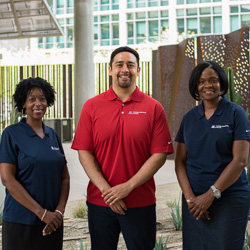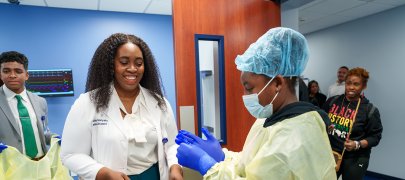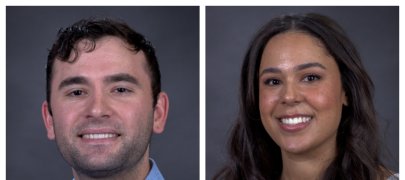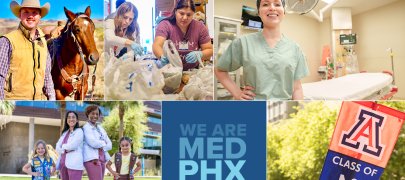Diversity Team Works Hard to Ensure Inclusivity

Sonji Muhammad, assistant director for the team, said the department began taking shape in the fall of 2014. “I wanted to be involved with the office when I saw the focus wasn’t on compliance, but actually working with the entire college in making it a more inclusive, nurturing and respectful environment for students, faculty and staff,” she said.
“Everyone deserves an opportunity to succeed and with diversity, we work with others and look for ways to make that happen,” Muhammad continued.
The department has recently expanded through the addition of Associate Dean Francisco Lucio, JD. He previously served as director of Diversity and Inclusion at New York University School of Medicine, where he helped lead the development of key institutional diversity initiatives. “I think I can bring a lot of positive experience to this role,” he said.
Lucio was a middle-school teacher in his hometown of Salinas, California, where he taught English as a second language. “I enjoyed teaching students and the educational environment,” he said. Ultimately, though, Lucio desired a career where he could work both with students and outside of the classroom. Diversity and Inclusion work in an academic medical institution setting was the perfect marriage between his love of education and law background. “The benefit of understanding law and policy and the need to advance diversity in health care has been a great benefit in my position.”
L’Tanya Miller, administrative associate for the department, recently joined the team, as well. “One of my favorite parts of the job is being a part of the initial development of the team that will make up Diversity and Inclusion,” she said. “I love being part of a team as it is being built and experiencing the process of its maturation.”
Miller has a diverse background. Prior to joining the University of Arizona, she worked as a welder for the United States Navy, an administrator for the discipline initiative department at the Department of Education and an office manager at Intel Corp.
“A robust diversity department will help to shape the next generation of medical professionals who will deal with topics still being debated in the political world, but is something that the medical field cannot wait for a legal outcome because ‘life’ cannot be put on hold for a consensus,” Miller said.
Muhammad echoed Miller’s statement about the importance of a robust diversity department.
“It’s in line with our mission, which is to train exemplary physicians, scientists and leaders while focusing on our core values, which include diversity and excellence,” she said. “Diversity means excellence. While there are many myths that diversity lowers standards, they are myths. Actual research has shown how it does the opposite.”
Muhammad has spent most of her career in the corporate sector, but in the last five years has transitioned to working in academia. “No matter your position at the college, everyone contributes to student success.”
The long-term vision for the Office of Diversity and Inclusion will focus on helping to incorporate a culture shift at the college that centers on Inclusive Excellence, a structural institutional cultural transformation ensuring that both diversity and inclusiveness are ubiquitous values that permeate the entire institution. To help achieve this, the Office of Diversity and Inclusion will focus on developing a comprehensive strategic plan that emphasizes collaboration with all departments at the college and with our affiliates.
About the College
Founded in 2007, the University of Arizona College of Medicine – Phoenix inspires and trains exemplary physicians, scientists and leaders to optimize health and health care in Arizona and beyond. By cultivating collaborative research locally and globally, the college accelerates discovery in a number of critical areas — including cancer, stroke, traumatic brain injury and cardiovascular disease. Championed as a student-centric campus, the college has graduated more than 800 physicians, all of whom received exceptional training from nine clinical partners and more than 2,700 diverse faculty members. As the anchor to the Phoenix Bioscience Core, which is projected to have an economic impact of $3.1 billion by 2025, the college prides itself on engaging with the community, fostering education, inclusion, access and advocacy.


